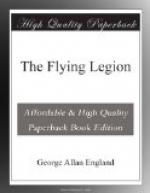The brush of a Verestchagin, a Gerome, a Bida, skilled in the colors of the Orient, would have been needed to paint even an impressionistic coup d’oeil of this scene surpassing strange, now opening out before the Legionaries’ eyes. Its elements were golden houses with door and window-frames of cedar, sandal, and teak; fretwork golden balconies overhanging streets and gardens where delicate palm-fronds swayed—balconies whence no doubt kohl-tinted eyes of women were peering at the strange men in khaki, as henna-dyed fingers pulled aside silken curtains perfumed with musk and jasmine; mosques and minarets carven of the precious metal; dim streets, under striped silk awnings; a world of wonder to the Legion.
The Master saw, as the cavalcade swept along at unabated swiftness, glimpses of terraced roofs and cupolas tiled with blue and peacock hues; open-fronted shops hewn out of the all-present gold and displaying wares whereof the purchase-price could not be imagined since gold was everywhere; bazaars heaped with babooshes, cherchias, and robes of muslin, wool and silk, with fruits and flowers, tobacco, spices, sweetmeats, and perfumes, and with strange merchandise unknown.
He caught swift vision of a wide mirbad, or open court for drying dates; and then, through a low, golden arch, a camel-yard with a vast number of kneeling, white dromedaries. And everywhere he saw innumerable hosts of the people of Jannati Shahr.
The streets themselves were clear of people as the cavalcade thundered on and on with many turnings; but every doorway, shop, arch, roof, terrace, and tower was packed with these silent, white-clad folk, bronze-faced and motionless, all armed with pistols, rifles, and cold steel.
What some poet has called “a joyous fear” thrilled the Legion. No, not fear, in the sense of timidity, but rather a realization of the immense perils of this situation, and an up-springing of the heart to meet those perils, to face and overcome them, and from out their very maw to snatch rewards beyond all calculation.
Even the Master himself, tempered in the fires of war’s Hell, sensed this tremendous potentiality of death as the tiny handful of white men galloped on and on behind Bara Miyan. Here the Legion was, hemmed and pent by countless hordes of fanatics whom any chance word or look, construed as a religious insult, might lash to fury. Five men remained outside. The rest were now as drops of water in a hostile ocean. In the Master’s breast-pocket still lay Kaukab el Durri—and might not that possession, itself, be enough to start a jihad of extermination?
Was not the fact of unbelieving dogs now for the first time being in the Sacred City—was not this, alone, cause for a massacre? What, in sober reason, stood between the Legion and death? Only two factors: first, the potential destruction of the Myzab and the Black Stone in case of treachery; and second, two tiny pinches of salt exchanged between the Master and old Bara Miyan!




